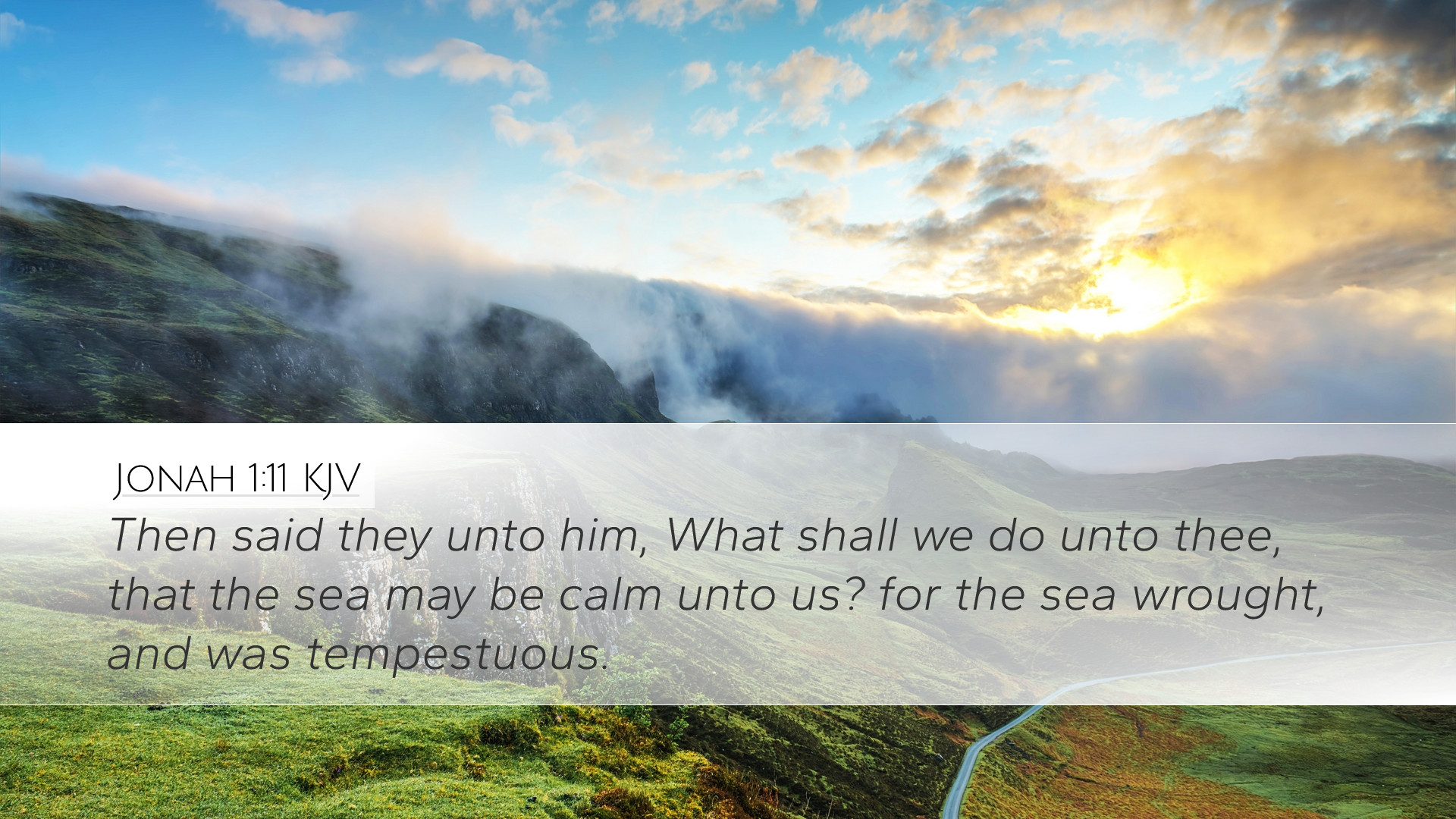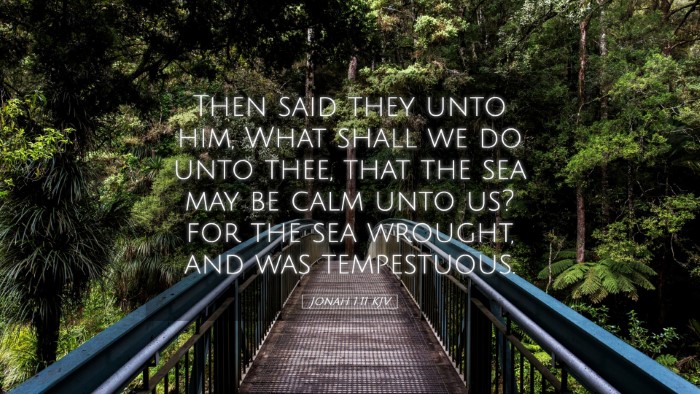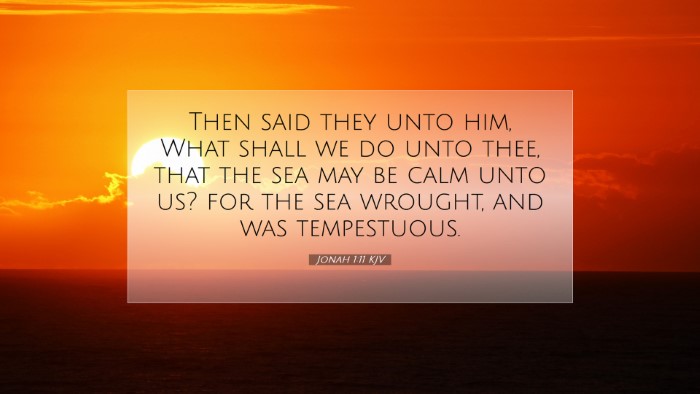Old Testament
Genesis Exodus Leviticus Numbers Deuteronomy Joshua Judges Ruth 1 Samuel 2 Samuel 1 Kings 2 Kings 1 Chronicles 2 Chronicles Ezra Nehemiah Esther Job Psalms Proverbs Ecclesiastes Song of Solomon Isaiah Jeremiah Lamentations Ezekiel Daniel Hosea Joel Amos Obadiah Jonah Micah Nahum Habakkuk Zephaniah Haggai Zechariah MalachiJonah 1:11
Jonah 1:11 KJV
Then said they unto him, What shall we do unto thee, that the sea may be calm unto us? for the sea wrought, and was tempestuous.
Jonah 1:11 Bible Commentary
Commentary on Jonah 1:11
Jonah 1:11 states, "Then said they unto him, What shall we do unto thee, that the sea may be calm unto us? for the sea wrought, and was tempestuous." This verse encapsulates the desperation of the sailors as they confront the chaos brought by Jonah’s disobedience to God. The impending tempest serves as a dramatic backdrop for understanding divine judgement and mercy.
Contextual Overview
The Book of Jonah is a narrative that highlights the themes of disobedience, repentance, and divine mercy. Jonah, a prophet of the Lord, is called to prophesy against Nineveh, yet he flees from the divine command. The storm that arises at sea is not merely an atmospheric phenomenon; it symbolizes divine intervention designed to redirect Jonah and to awaken the sailors to their mortality and sinfulness.
Insights from Public Domain Commentaries
Matthew Henry’s Commentary
Matthew Henry elaborates on the nature of the tempest, indicating that it was sent by God as a warning both to Jonah and to the sailors. The urgency of their question reflects their awareness of the grave situation they find themselves in. Henry posits that the sailors, though they may be idolaters, were pragmatic in their search for a solution. Thus, they turn to Jonah, hoping to assuage the wrath of the sea.
He notes that their question—“What shall we do unto thee?”—displays a critical acknowledgment of the prophetic significance of Jonah’s presence among them. His disobedience is directly linked to the calamity they face, illustrating the interconnectedness of human actions and divine judgment.
Albert Barnes’ Notes
Albert Barnes stresses the sailors’ predicament, equating their lives to fragile vessels at the mercy of nature's fury. He highlights the point that they are not only concerned for their lives but are also seeking Jonah's counsel, suggesting a level of respect or recognition of Jonah’s authority. Barnes points out that the sailors’ dilemma lies in their ignorance of the true God and yet, paradoxically, in their instinctive grasp of accountability in adversity.
He emphasizes the theological implications of divine sovereignty, indicating that the storm was a direct consequence of Jonah's disobedience, which correlates with a larger narrative of God’s plan to save the city of Nineveh. Barnes effectively links this event to the broader themes of repentance and grace, underscoring that even amidst rebellion, God orchestrates His purpose through his prophets—the very vessels that attempt to flee.
Adam Clarke’s Commentary
Adam Clarke brings a distinctive perspective by arguing that the sailors’ inquiry reflects both desperation and a flicker of hope. The question of what they must do to calm the sea is metaphorical, extending beyond mere physical safety. Clarke interprets their fear as symptomatic of their awareness of a greater moral and spiritual imbalance that has been introduced by Jonah’s actions.
Clarke suggests that this question is pivotal, as it opens the door for Jonah to confront his responsibility. By acknowledging his role in the turmoil, Jonah is not only prompted to reflect on his relationship with God but also to recognize the impact his disobedience has on others. Clarke draws attention to the concept of collective responsibility, prompting readers to consider how individual actions can reverberate through communities.
Theological Implications
The inquiry posed by the sailors serves as a pivotal moment in the text, revealing the intricate dynamics between divine will, human responsibility, and intercession. Each commentator adds a layer to our understanding of this verse:
- Divine Sovereignty: The tempest is a result of divine orchestration, showcasing God's authority over all creation.
- Human Responsibility: Jonah’s actions serve as a reminder that individual disobedience can escalate into wider consequences, affecting those around us.
- Intercession and Redemption: The sailors' response encompasses a search for redemption, hinting at the broader redemptive arc that characterizes the narrative of Jonah.
Application for Contemporary Readers
This verse invites reflection among pastors, students, theologians, and Bible scholars concerning the nature of obedience, accountability, and the transformative power of divine intervention. It serves as an exhortation to consider how our personal spiritual journeys influence the communities we inhabit.
Moreover, Jonah’s initial flight raises critical discussions about the modern-day scenarios of avoidance in ministry and service to God. The chaotic sea may mirror our internal struggles and the storms we face when we stray from our calling.
Ultimately, Jonah 1:11 calls us to recognize that amidst our storms, there is an invitation to repentance and the assurance that God, in His mercy, remains steadfast in pursuing wayward hearts.
Conclusion
In summary, Jonah 1:11 is loaded with theological significance and personal application. The unity of purpose between divine intent and human action unfolds through this passage, serving as a poignant reminder of the responsibilities we bear as carriers of God's message. It necessitates not only self-examination of our walk with God but also a keen sensitivity to how our actions influence others around us.


